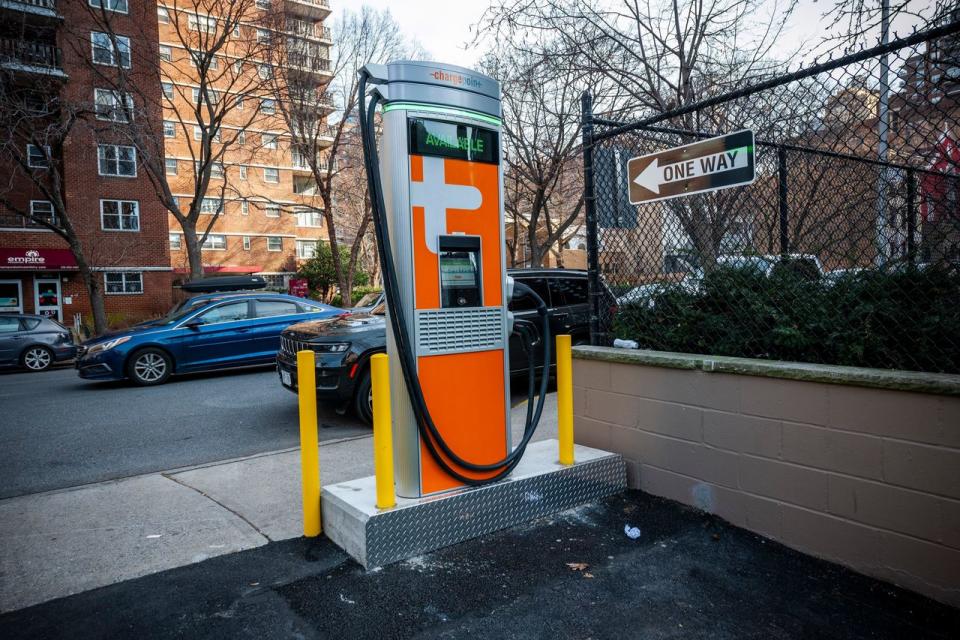Will Tesla’s EV Charging Slowdown Supercharge Competitors?

News that Tesla, the dominant EV charging provider, is pulling back from that business has electrified some unloved EV charging stocks. Should investors plug back in?
Tesla this past week laid off much of the team responsible for creating its EV charging network, which accounts for at least 60% of all direct current fast charging ports in the U.S., according to data from Wood Mackenzie. Chief Executive Officer Elon Musk wrote last week on X that Tesla still plans to grow the Supercharger network but at a slower pace.
Most Read from The Wall Street Journal
My Mom and Dad Owned Competing Side-by-Side Hardware Stores. It Was a Lesson in Life.
Desperate for Workers but Dead Set Against Migrant Labor: The West Virginia Dilemma
Disney and Warner to Offer Bundle of Their Streaming Services
EV charging stocks, which had taken a beating over the past three years, rallied on the news. ChargePoint and Blink Charging have gained 32% and 16%, respectively, since last Monday, when layoffs were announced. But EVgo, which had gained nearly 9% since Tesla’s announcement, gave up those gains and more on Tuesday following its latest earnings call. It beat Wall Street expectations on both the top and bottom line, but the sudden announcement of its chief financial officer’s departure to join another company might be weighing on the stock.
There is no question that Tesla’s move leaves a large opening for competitors. No company has been able to match Tesla’s speed of EV charging build-out, its low cost or its reputation for reliability, according to industry analysts. Tesla added 3,347 fast-charging ports in the U.S. in the first three months of this year—nearly three times as many as the next three biggest competitors combined over the same period, according to Wood Mackenzie data.
EVgo’s CEO Badar Khan said on the company’s earnings call on Tuesday that Tesla’s pullback from charging is “a very significant change in competitive dynamics in the charging space” and that the company is in talks with site hosts that might have been left hanging after Tesla’s announcement. The company is also looking to hire employees that Tesla laid off.
Whether competitors can take full advantage of the vacuum Tesla has created is another question. Hiring ex-Tesla employees might help companies install chargers more quickly and cheaply, but faster growth will ultimately require more funding. This is more of a constraint for capital-intensive owner-operators such as EVgo and less so for manufacturers such as ChargePoint and Blink.
RBC equity analyst Christopher Dendrinos noted in a research report that EVgo “does not yet have sufficient scale to be self-funded” and that it might need additional funding to get to scale. EVgo said on Tuesday’s call that it is in talks with the Energy Department’s loan programs office.
And there is another consideration: EV charging stocks are heavily dependent on the pace of EV adoption and Tesla’s latest moves offer mixed messages on the speed of that growth.
On the one hand, Tesla’s move will slow down the build-out of EV charging infrastructure—possibly creating another speed bump for EV adoption. EV sales in the U.S. slowed dramatically in the first quarter, up just 2.6% year over year, per Cox Automotive. But if Tesla’s pullback from charging gives it more resources for rolling out affordable vehicles then that would be a good thing for EV adoption. Cheaper EVs are especially important for fast chargers because they open up the market for those living in multifamily homes that might not have access to at-home charging.
The biggest question, of course, is whether stand-alone EV charging companies can ever become profitable. The space left by Tesla doesn’t offer any new answers. Most listed charging companies have yet to achieve profitability—even those operating abroad—according to analysis from BloombergNEF. ChargePoint expects adjusted earnings before interest, taxes, depreciation and amortization to turn positive by its fiscal fourth quarter, which ends next January, while EVgo expects the same some time next year. But the earliest that Wall Street expects to see annual profit according to Generally Accepted Accounting Principles is 2027 for EVgo and Blink and 2028 for ChargePoint.
Tesla’s latest move clears the road, but it won’t remove many speed bumps.
Write to Jinjoo Lee at jinjoo.lee@wsj.com
